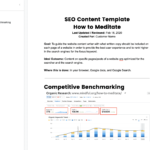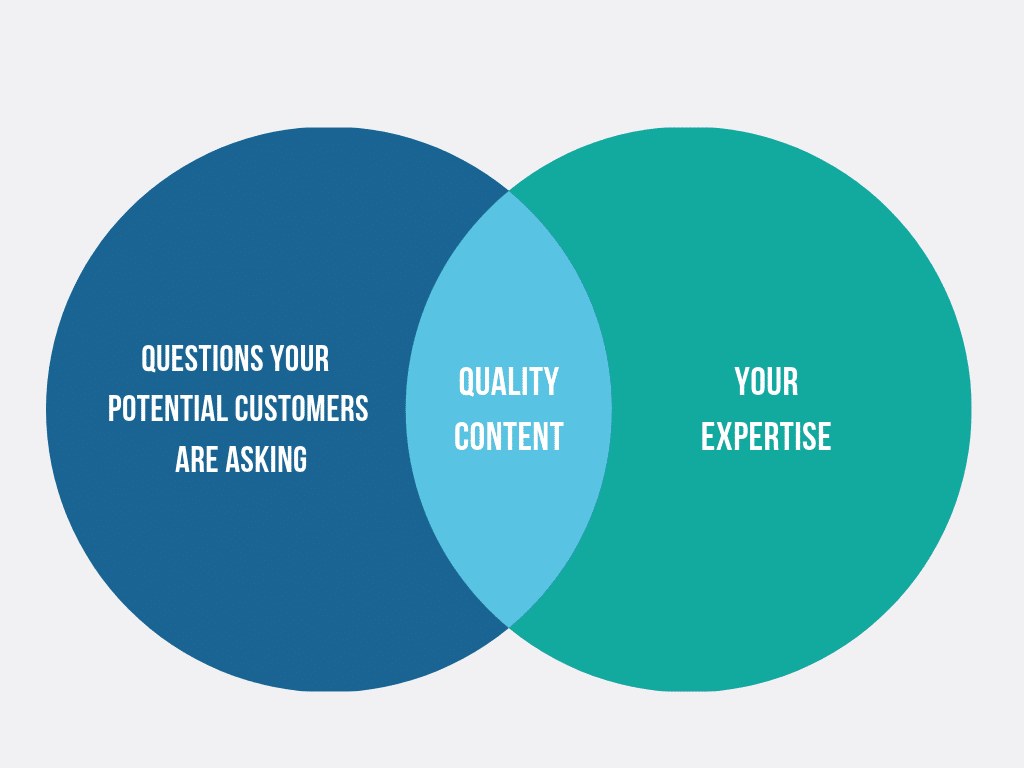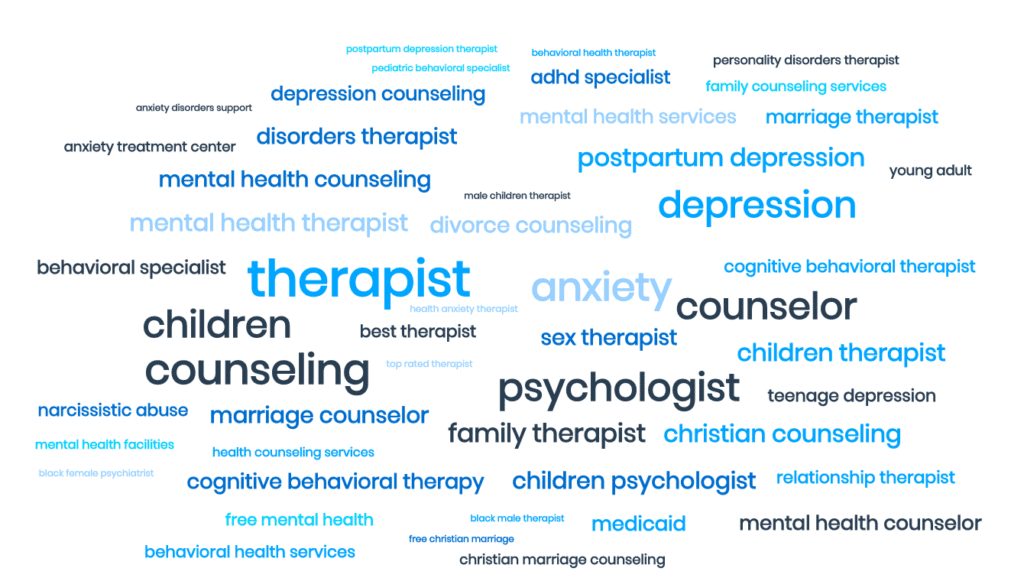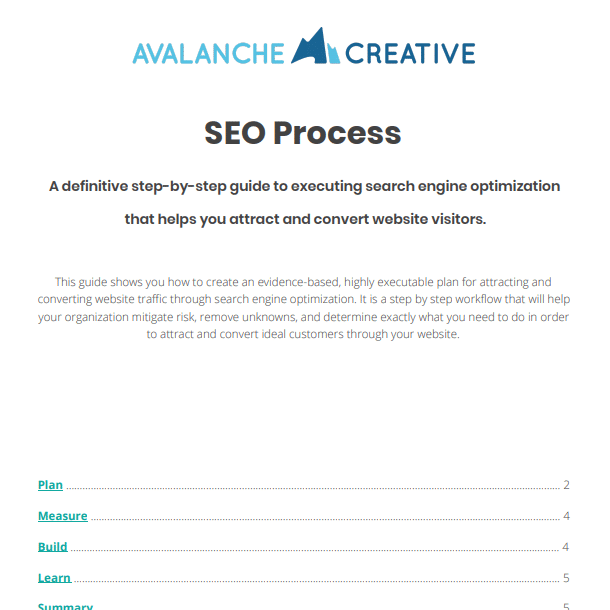SEO for Therapists: A Complete Guide
Category: Healthcare, Industry Guide | Tags:
This guide contains everything we know about SEO and content marketing for therapists and counselors. We constantly update this article to help local therapists with their SEO and content marketing. For your convenience, we’ve broken it up into a table of contents.
Table of Contents
An Example of How SEO for Therapists Works
We want you to understand why search engine optimization is so crucial for Therapists, while also establishing ourselves as a credible source on the topic.
We are a marketing agency for therapists and offer comprehensive SEO services that can help therapists dominate their local market and generate leads for new clients.
Think like your clients.
Unlike asking for a referral on Facebook for a local plumber or other service, people generally don’t publicly or even privately ask for referrals for therapists. People tend to value privacy when it comes to healthcare and that includes mental health and counseling services.
Whether it’s right or wrong, when people need a therapist or counselor locally, they use search engines like Google to find them.
Google and other search engines are safe. People know they can search independently without having to admit publicly that they are in need of a counselor.
Take a look at the screenshot of our keyword research from SEMRush for the keyword “female therapist near me.”
As you can see, that keyword alone gets searched around 480 times per month nationally. But, there are also 47 variations of ways in which female therapist near me gets searched.
RELATED: 1,000 Local Counselor Keywords
The user intent of this search is pretty clear. The searcher is interested in a female therapist near their physical location.
What is user intent?
User intent is what a user online intends or wants to find online when they type their search term into an online search engine.
Since we know the term that includes “near me” has a pretty significant volume, it’s safe to assume that people in your city also search with “near me” or by their location like “female therapist grand rapids.”
This means there’s a good chance that you are a female therapist or have female therapists at your practice, you should optimize your site for this term.
But how do you optimize for a term like that?
Optimizing for a search term like female therapist near me is kind of awkward.
While we highly recommend having a therapist page and having dedicated pages for each of your therapists (more on that later), it would be kind of strange to have a picture and bio of your female therapist and include a sentence about how your female therapists are female therapists.
But, if you don’t indicate that they are indeed female, Google won’t know and can’t recommend your local practice for this term.
Enter: alt tags.
Alt tags are HTML attributes that are added to image tags. Alt is short for alternative. Since search engines can’t completely understand and describe an image, we need to add these alt tags to images to help Google and other search engines understand them.
What does this have to do with increasing our position in Google for “female therapist near me”?
A well-described headshot of each of your therapists would include details like gender, race, etc.
So, if you have female therapists, use your alt tag to add that context. You might describe a female therapists alt tag like this:
FIRST NAME LAST NAME, Female Therapist in CITY.
We know this works because that’s exactly how we get clients to rank in the Google Map Pack (top 3 results in the map for searches with local intent):
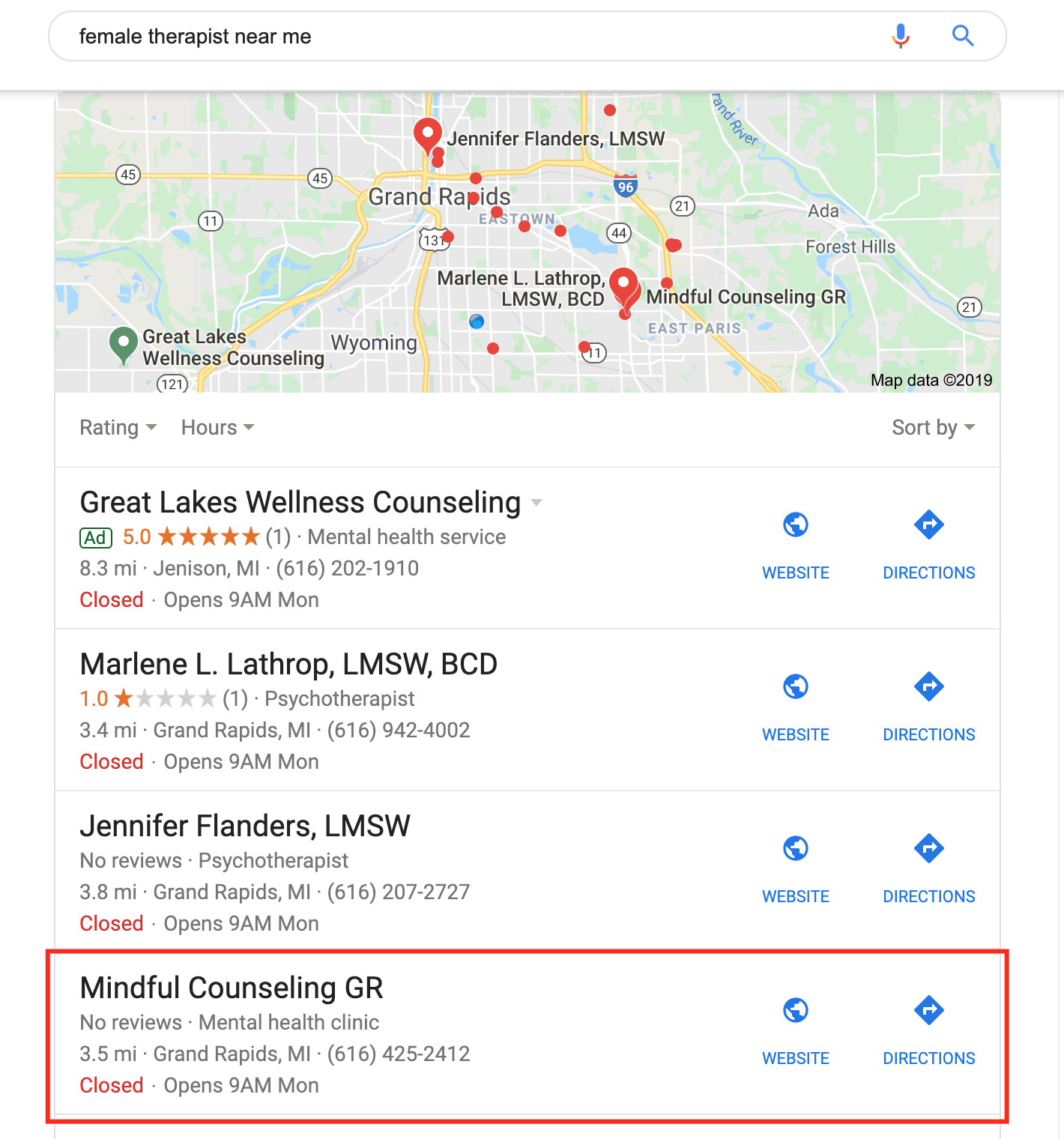
In the picture above you’ll see an ad and three organic results in the map pack.
Our client, Mindful Counseling GR, made it into this position in part because of optimizing alt tags so Google understands that they have several female therapists.
It’s true that Google doesn’t reveal how exactly their powerful search engine works, but, we do know they are trying to offer the most relevant, helpful, and trusted results they can for their searchers.
If you want to attract and convert more local clients to your practice through the search engines, you need to position your website to offer relevant and helpful information and build your trust online.
For more on exactly how to do that, read on.
Why SEO for Therapists?
Search engine optimization is one of the best digital marketing channels for local therapists to invest in because people looking for therapists spend time online searching for and learning about counseling services.
This can be evidenced by the screenshot below which is a visual representation of the questions people ask in Google that include the words “couples counseling.”

Keyword research like this is vital to an effective SEO strategy. It reveals the need for SEO and quality content for your therapist website.
If you want to build your business to be the local expert and authority on couples counseling, you have to truly empathize with potential clients.
Keyword research can help you understand and empathize with your local clients through the search queries they make.
Understanding what questions your potential clients ask in Google is a great way to empathize with them.
What is your potential client really looking for when they search for something like “couples counseling + [YOUR CITY]”?
We learned that when two people search for something like “couples counseling grand rapids” they are more often than not looking for slightly different information. Here are some questions that people could really be looking for from a local therapist/counselor:
- what is the cost of couples counseling near me?
- what’s the best couples counseling near me?
- what does a session look like?
- how many sessions until we see a breakthrough?
- what does your space look like, is it safe?
- who is my counselor going to be?
You get the idea. There are a lot of questions that are going to come to mind for that person searching for “couples counseling near me.”
The best way to build relevancy is to make sure you have a page on your website dedicated to the questions you know people ask in search engines that are related to the types of counseling you offer. If they ask Google, you can be sure they’re going to ask them of your organization at some point.
There’s no doubt that SEO is important for therapists. Here are some of the top reasons why SEO and content marketing are so important for therapists:
- People self-educate online.
Based on available data, we know that people are preparing to reach out to a local therapist by the questions and statements they make in Google. They start by trying to understand what the experience of counseling will be like for them or their loved ones and then find the place and the person they think can help them best locally. If your practice isn’t on page one when they make that “ready to contact” search, you’re missing out. - SEO is a brand builder.
With a good SEO strategy, you can help your potential clients and people across the internet who are looking for help. You can position your site to not just be a local authority on counseling, but you can write and rank nationally for specific counseling services. - Great content on your site increases inquiries.
When people look for counseling services near them they want to feel comfortable with the therapist they eventually meet with. A great way to give them confidence is by having information about your therapists front and center. Make sure to have a dedicated page for each of your therapists with an image, bio, a video, their counseling specialties, and links to articles they have written. The easier it is for someone looking for a therapist to become comfortable before reaching out, the better. Have your therapists write an article about their specialty once every other month at the very least.
How to Market a Therapist Practice
This is a big question that if we answered completely could fill a book. Marketing for counseling services is slightly different than marketing for other local products and services or even other healthcare services. Your client is sharing their thoughts, feelings, and personal matters with another stranger with the hope of overcoming or breaking through some kind of conflict or pain in their lives.
That’s tough to market.
The good news is that the internet and search engines, in particular, have made it easier for therapists to learn how to market their practices.
Using Customer Empathy to Market Your Practice
We tell every customer that we work with to learn to develop empathy for their customers.
This couldn’t be truer for therapists.
In order to successfully execute digital marketing, you need to know more and care more for your customer than your competition.
Search engine research can help you do this.
By using a tool like answerthepublic.com you can research the questions and prepositions people ask Google related to types of counseling.
This should inform your content strategy. It should inform what you include and continue to write about on your private practice website. But remember that online content isn’t just a blog post anymore. It’s images, video, slideshows, web applications, and more. All of this content can help establish your brand as a leader in your space and make you more desirable.
Imagine being able to solve a problem for your customer before you’ve talked to them. A great blog post or online tool can do that. Helping them first doesn’t just create an opportunity for a new customer, it creates a brand advocate.
The strategy, tactics, marketing channels you choose, time and capital investments you make all need to hinge on your potential client’s needs.
SEO Strategies and Tactics for Therapists
What is SEO for Therapists?
SEO or search engine optimization for therapists is the process of getting quality traffic to your site with the intent of converting that traffic into a new client lead. For the most part, the tactics behind SEO for therapists aren’t that different than any other industry. However, there are a few nuances.
- Generating reviews.
Reviews on Google and other third-party review sites are great signals of trust for your local therapist practice. But, unlike most other local services, asking for reviews is a little less natural and in many cases, therapists prefer not to ask for reviews altogether. The trick to generating reviews without explicitly asking or incentivizing is to just do an outstanding job. Understand what your clients’ expectations are and then go above and beyond them. This will increase the chances of generating quality reviews. - Case study or testimonial limitations.
Similar to reviews, it’s not easy to find a client willing to share their story in a blog post or video for your website. Those client case studies can be powerful, but in many cases there are limitations. Even if you can find someone willing to offer a testimonial for your site, they often won’t share enough detail to be very helpful to your site’s SEO.
Below is an SEO checklist of tactics you need to execute an effective SEO campaign.
On-Page, Off-Page, & Technical SEO
SEO can be broken down into three general categories; on-page SEO, off-page SEO, and technical SEO.
On-page SEO is mainly the content on your page. Keywords, titles, headings, meta descriptions are all SEO signals that are on a page of your website. Search engines want to make sure the content is relevant to the search term or keyword. Relevancy plays a big role in on-page SEO for therapists.
Off-page SEO is everything from other web pages that help a particular page on your site rank. There are several factors, but the biggest are backlinks or links from other sites to your site. It’s crucial to have a good volume and good quality or relevant backlinks to validate your trust and authority.
Technical SEO is, for the most part, all under the hood of your website. It’s making sure your website is developed so that it is crawler friendly, has an SSL certificate, loads fast, etc.
Meta Titles and Descriptions
Meta titles or page titles are the titles of each individual page or post on your website. These are not necessarily visible on the page, but they are visible to the search engines. You have control over this title and what it says so it is crucial that you optimize these titles to stand out.
Meta titles are one of the most overlooked, but powerful SEO tactics therapists have to rank higher. Look at the title below from Thriveworks. We searched for “anxiety counseling services near me” and this was on the top of page one:
The area in red is your meta or page title. This you have control of. Thriveworks has done a good job optimizing this title for the keyword we searched because it includes
- The city we are located in.
- The keyword “anxiety.”
- The name of the practice at the end, not the beginning of the title.
Meta descriptions or page descriptions are another HTML attribute that provides a summary of a page or posts content. These can also be optimized for the search engine results page, but Google will often manipulate them for certain search terms. See the image below in the red. Google has changed this description indicated by the “…” in the middle of the description in order to help the searcher understand that the page does in fact mention “anxiety” multiple times.

Keyword Research
No matter the industry, an effective SEO strategy hinges on really good keyword research and then careful content planning. It’s no different for therapists.
It’s important to know exactly what potential clients are searching for in your city when they need counseling services or therapists.
We always start by building a big list of keywords and look at the national keyword volume. By looking at how people search for therapists nationally we can determine the best keywords to focus on locally.
Below is a screenshot of some of our keyword research using SEMRush:
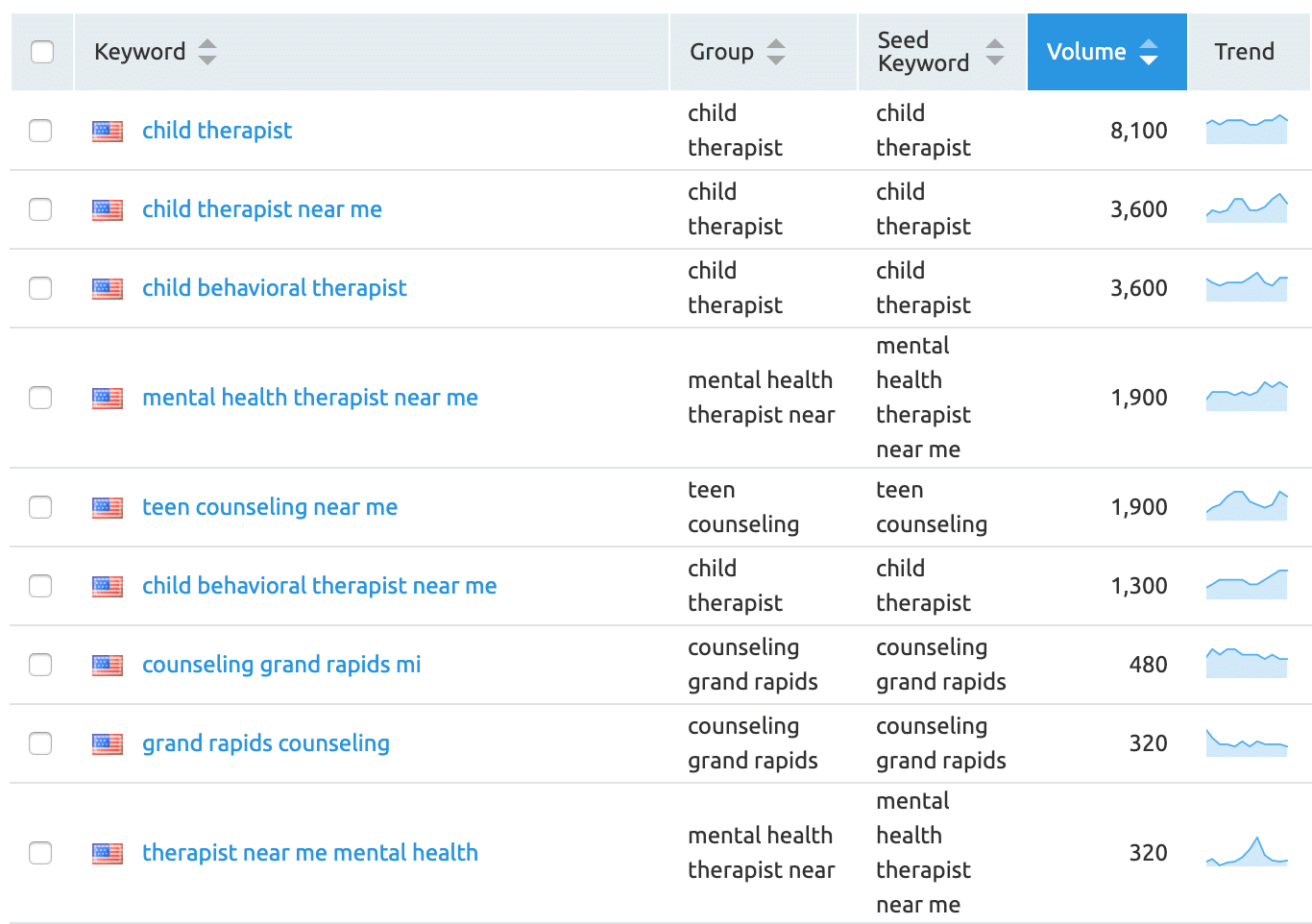
Working with our client (a local Grand Rapids, MI counseling practice) we carefully selected our keywords.
Keyword research is the art and science of looking at how people search and how often they search for it. Good keyword research also involves investigating what the intent of the user is for each keyword. People can use the exact same words, but be looking for something different. Understanding possible intent helps us to determine what you need to include on your site to rank highly for each keyword.
To perform keyword research we use a tool that allows us to put in a broad term like “counseling services” to start getting ideas for how people search for counseling services:
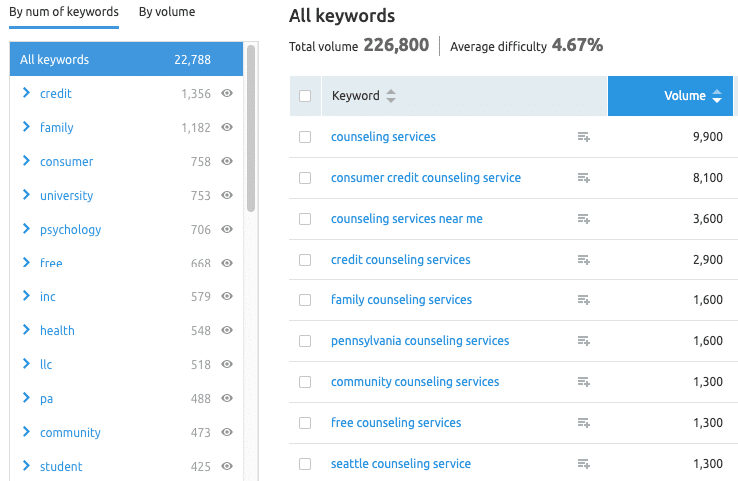
You can see there are some irrelevant keywords right away, but we can drill down and see that people include terms like “student” in their phrase related to counseling services.
This means it would be helpful to have some content on your website about how you work with local college or high school students and talk about some of the common challenges they face.
After doing research we then put keywords into a project where we can see local keyword volume:
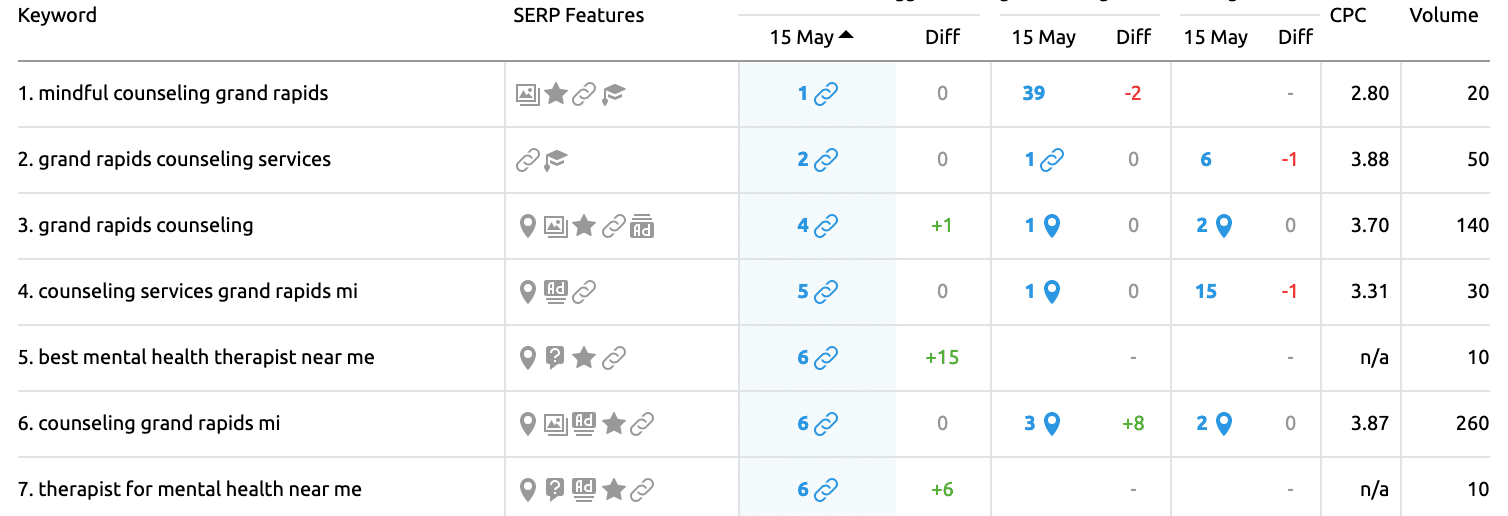
This allows us to get a competitive view of actual local searches for counseling services and therapists.
What you see in the image above under the column “SERP Features” are icons that represent additional information or features that show up in Google search results.
For example, we can see if our client or any of their local competitors are running ads on certain keywords, show up in the Google Map Pack (one of the three spots in the map for local search), and several other features.
Here is a list of keywords we’ve used for a local counseling service. This isn’t an exhaustive list of local SEO for therapist keywords. It is specific to one private practice. Their practice may be different than yours, so keep in mind that this may not include important keywords. Replace any mention of the city “Grand Rapids” with your local city.
Keyword Ideas for Therapists
mindful counseling grand rapids
best child therapist near me
grand rapids counseling services
adolescent counseling grand rapids mi
child therapist for divorce
marriage counseling grand rapids mi
grand rapids counseling
child therapist
counseling services grand rapids mi
marriage counseling grand rapids
best mental health therapist near me
male mental health therapists near me
counseling grand rapids mi
christian marriage counseling grand rapids mi
therapist for mental health near me
child anxiety therapist
mental health therapist near me
teenage counseling services near me
teen counseling near me
female mental health therapists near me
relationship counseling grand rapids
christian mental health therapist near me
family counseling in grand rapids mi
child mental health therapist near me
child anxiety therapist near me
grand rapids mental health services
relationship counseling grand rapids mi
grief counseling grand rapids mi
child therapist near me
mental health services grand rapids mi
couples therapy grand rapids
premarital counseling grand rapids
child behavioral therapist near me
christian counseling for teens
child therapist grand rapids mi
child therapist that accept medicaid
child counseling grand rapids mi
child life therapist
family counseling grand rapids
therapist near me mental health
grand rapids family counseling
grand rapids mental health
family counseling grand rapids mi
child behavioral therapist
couples therapy grand rapids mi
child trauma therapist
couples counseling grand rapids mi
counseling jobs grand rapids mi
couples counseling grand rapids
grand rapids mental health resources
anxiety therapy grand rapids mi
mental health counseling
couples therapy in grand rapids mi
addiction counseling grand rapids mi
Page Load and Mobile-friendliness
Your page load time is crucial not only to SEO but your potential customer’s experience. Google will promote sites with a faster page load speed if it enhances the user’s experience. This is especially important when loading over mobile devices, which are often being used on 3G and 4G connections with slower download speed.
Keep the size of your images and other large media minimal and work with an experienced web developer to optimize your site for speed.
Learn more about page load speed.
Your website needs to be mobile-friendly. Your target audience is searching for you on mobile devices and with Google’s mobile-first indexing, you can’t ignore the importance of a mobile-friendly website. Mobile-first indexing is essentially Google stating that they are prioritizing mobile-friendly sites when people search on their mobile devices.
Web Design
Your website design is important to the user’s experience. If your potential customers can’t easily find what they are looking for, you may miss out on new potential clients. It’s important to consider internally linking between pages to add context and help the user navigate.
Think about a parent searching for counseling services for their child.
They may navigate to your “child counseling” page, but there is likely something more specific they are looking for like anxiety, addiction, depression, divorce, school counseling, etc. Don’t overwhelm, but make sure your site has information about these types of counseling services if you offer them.
When it comes to web design for therapists, it can be challenging to use thoughtful architecture. Since a lot of your content should be contributed by your therapists, you’ve got a lot you could write. It can be easy to get lost. Make sure to plan your website content carefully and group topics together.
Link Building
Link building is the process of acquiring backlinks or links from other sites to your website. This is really important for local therapists to build your expertise, authoritativeness, and trust locally.
Moz has a list of local citation websites for psychologists. These are websites that will typically list your business for free. Although your customers may not find you often on these sites, it’s great to have your business listed there for credibility.
Social Media
Utilizing your social media channels, you should be promoting the content you publish on your website. If you have identified demand for the content you are investing in producing, it can be beneficial to share it and stay relevant and top of mind with your target audience.
We recommend sharing snippets and links to a mix of articles that you write on your own site and that others write that your audience would benefit from. Don’t share content that is self-promotional. Share content that is helpful to your ideal client.
Local SEO
If you are a local practice it’s important to consider Local SEO. Local SEO helps you optimize your site for a local audience. If your target audience is physically close to your company’s location, it’s important to add some additional tactics to your SEO strategy.
There is a lot to cover with local SEO, but for a quick reference make sure you:
- Create a Google My Business account and optimize it by adding the types of counseling services you offer and making sure all your business information is complete.
- Mention the areas you serve on your website and possibly even create a web page for each location. Create a “service-area” page and then list all the surrounding cities you serve. This helps add context to the search engines so they know who to help when they search “near me” or one of the cities you serve.
- Make sure you are listed on other local citations like your local Chamber or other friendly counseling services.
Content Marketing for Therapists
Why do we bring up content marketing on a guide about SEO? Because an effective SEO strategy for therapists is co-dependent on content. SEO and content go together like peanut butter and jelly.
The beginning of any effective content marketing strategy for therapists begins on a foundation of a thorough keyword research process, which is also the foundation of great SEO.
Our keyword research process for therapists is below.
How to Identify Content Marketing Ideas
Talk to Your Customer
Talk and then listen, really. While I’m sure you understand your service really well, that’s most likely not true of your customer.
Your client doesn’t live in your world and they’ll use different words to describe what they need.
The best way to start to get ideas for content marketing is by asking your ideal customer the right questions.
The best part about content marketing for therapists is that you’re already always talking to your customer. It’s the job!
With that in mind, keep track of what they ask you, especially what they ask you before they’ve committed to their first appointment or first few sessions.
Consider the Venn diagram below:
Your goal is to identify quality content that is attractive to your ideal customer that you could create.
The pain, problems, or questions your potential or even current clients are asking should inform your content strategy.
Think about the keyword question, “when is couples counseling a good idea?”
If you’re a couples counseling therapist, you could probably write about this for days. Start building a list of moments when couples counseling would be a good idea. Chances are that if it’s a good list, the people reading will resonate with one option and start to build trust with you.
This is how you develop a great content marketing strategy.
Do Keyword Research
If you’ve read this guide, you’re probably starting to think I’m sounding like a broken record.
We can’t emphasize enough the importance of keyword research. The reality is that keyword research is never done. You should always be doing it to determine what kind of content would be valuable to your target audience.
By focusing on writing quality content on all the questions, topics, and subtopics people search for, you’ll begin to dominate the search engines.
Create a Shortlist
As you use your keyword research tool, add keywords to a shortlist. These can be high-intent, low-intent, short-tail, and long-tail. Add any that seem relevant for now. You can chisel them down later. The point of creating a big list is to get a good overview of your entire potential market and you can create a content plan based around all of your keywords.
Consider Content Types
Content is not just written copy and your target customer doesn’t want to just read. Content is anything your audience interacts with. For therapists, that’s certainly images and videos. Since your service is incredibly personal, it’s crucial to use video and images on your website so that visitors can freely “interact” with you and become more comfortable with the idea of meeting face-to-face.
Our SEO Services: Websites That Increase Traffic & Conversions
We create counseling and therapist websites and execute SEO & content marketing plans that increase traffic and conversions.
Attracting website traffic can be a challenging and daunting task. There are a lot of moving parts to your website. It’s a living organism that requires constant attention and maintenance. And then you have to think about quality, fresh content that you can contribute. Writing great, authoritative content takes time.
But, it can be worth the investment to your counseling practice with the right SEO strategy and content marketing strategy.
Evidence-based Therapist Marketing
At Avalanche Creative, we create evidence-based, highly executable search engine and content marketing plans for therapists. Our process takes the mystery out of the question, “should I invest long term in SEO and content marketing?” and provides a bullet-proof plan for how to execute therapist SEO and content strategy that drives more traffic, more qualified leads, and builds your brands authority.
We are an SEO company that specializes in SEO for therapists and counselors. Our SEO services mitigate the risk of a bad investment in search engine optimization. We do this by researching and planning more thoroughly than anyone else. We make sure your SEO and content marketing plan is truly investable. Chat with us to learn more.
Types of Therapists We Can Help
- Psychologists
- Counselors
- Psychiatrists
- Mental Health Counselors
- Christian Counselors
- Addiction Counselors
- Drug Abuse Counselors
- Family Counselors
Frequently Asked Questions
How do you market yourself as a therapist?
- Get a website and create great content for your target audience.
- Create a Google My Business account.
- Get on social media.
- Develop an ongoing marketing strategy.
- Offer free sessions at local businesses.
How can a therapist get more clients?
There are many ways for therapists to get more clients. Some of the best ways include:
- Investing in your own website.
- Developing a content marketing strategy.
- Doing search engine marketing like SEO & PPC.
- Building a referral network.
- Using all forms of digital marketing.
What are other ways therapists can market themselves?
- Email marketing – is a great way to share helpful, relevant content with your clients.
- SMS marketing – allows you to text from your computer to schedule reminders and even have conversations with your clients.
- Facebook ads – allow you to retarget website visitors to keep your name and brand top of mind.
- Google ads – allow you to immediately get on top of the search results for relevant keywords.
Share this article:
The Avalanche Email: Fun. Simple. Educational. No Selling.
Learn Result-focused SEO & Content
Join over 2,272+ others who get one email every Wednesday with simple instructions on how to get more website traffic and leads through SEO and content marketing. (Learn more about the email)
Keep Learning
Creating the Perfect SEO Content Template in Google Docs
Learn how to create an SEO Content Templates in Google Docs to help drive new traffic to your website from the search engines. SEO Content Templates provide specific recommendations and directives for creating new content on your website with the purpose of improving your SEO.
How To Show Up in Gemini (And Win More Local Jobs)
Show up in Gemini when homeowners search for landscaping services. Build the right signals on Google and your website to win more qualified local jobs.
How to Run Google Ads for Landscapers: A Complete Guide
Learn how to set up Google Ads for landscapers, attract qualified leads, and win more local jobs with this step-by-step guide.
🏔️ Watering > Planting New Seeds
Your next marketing win may already be on your site. Learn how to optimize existing pages for better rankings, traffic, and results.
The Recipe vs. The Meal
Your customers buy the experience, not the product. Discover a simple way to shift your message from ingredients to the full meal.
What’s the Best CMS for Landscaping Businesses?
Compare the best website platforms for landscapers. Learn the pros and cons of Wix, Squarespace, and WordPress, and why WordPress is best for long-term SEO.

![Keywords for Counselors & Therapists: A Complete List [Download Available]](https://avalanchegr.com/wp-content/uploads/2021/02/wordcloud-150x150.png)
